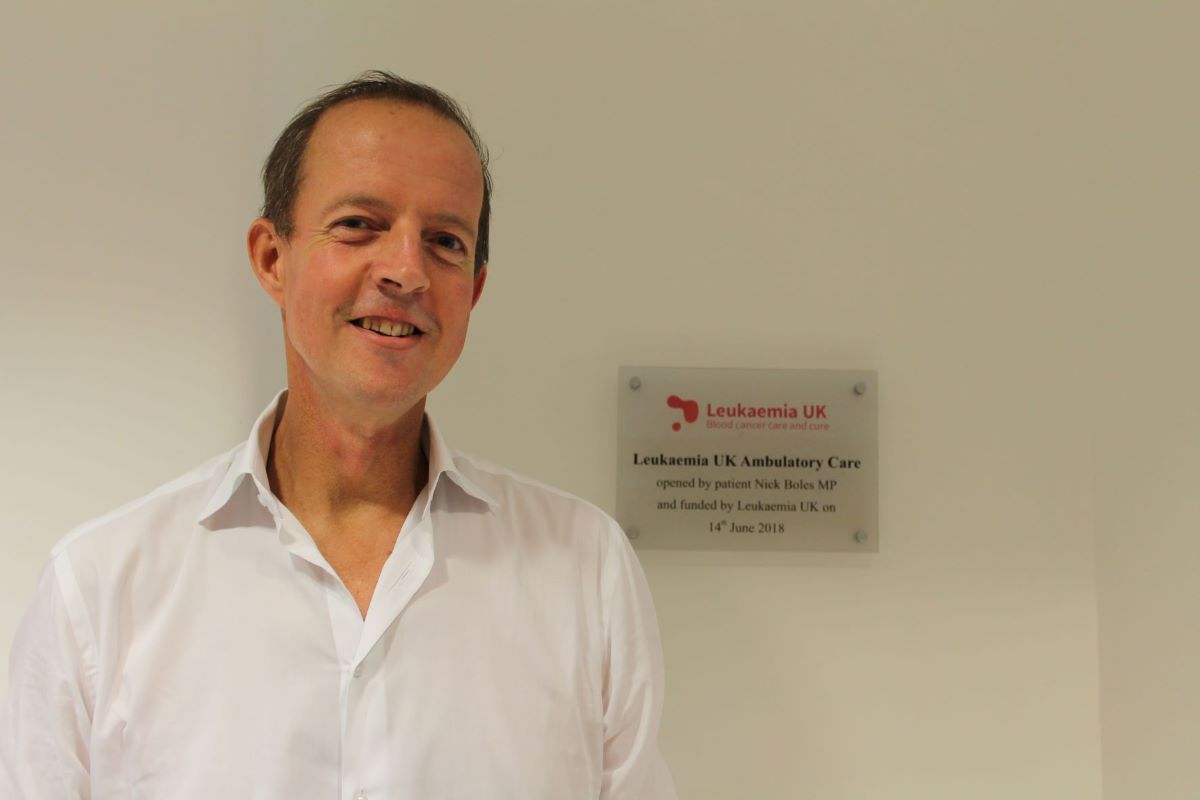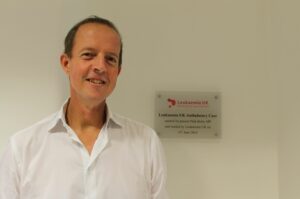
15 Jun 2018 Awareness raising
Nick Boles’ Ambulatory Care Unit opening speech
 Nick Boles, Conservative MP for Grantham and Stanford, was diagnosed with non-Hodgkin lymphoma in 2007 and experienced a relapse almost a decade later. He was the first person to undergo a stem cell transplant as an outpatient in the Leukaemia UK Ambulatory Care Unit at King’s College Hospital in London, and was invited to officially open the unit. Here is an extract of his speech
Nick Boles, Conservative MP for Grantham and Stanford, was diagnosed with non-Hodgkin lymphoma in 2007 and experienced a relapse almost a decade later. He was the first person to undergo a stem cell transplant as an outpatient in the Leukaemia UK Ambulatory Care Unit at King’s College Hospital in London, and was invited to officially open the unit. Here is an extract of his speech
It is now 15 months since I had that stem cell transplant, sitting in the middle chair in the row looking out over the railway tracks to Ruskin Park where I regularly walk my dog. No apology is required for the fact that I was the first patient! I bullied Orla [lead nurse, haematology] for months to be the guinea pig for the Ambulatory Care unit.
What I realised with this second batch, which was so much more aggressive and serious than the first batch of non-Hodgkin lymphoma, was that having a disease and dealing with a disease is quite like having a job.
I certainly felt that my relationship with King’s was quite like my relationship with the House of Commons now. It was not every day that I came here, but it was pretty near every day and it felt like a commute. It would take the best part of the day – maybe not as many hours as voting on Brexit – but it certainly would take the best part of the day.
But the key thing is at the end of the day for me – and I was so lucky and so few patients have this good fortune – I got to go home because I live 20 minutes’ walk away.
What I realised was that I could cope with having this ‘job’ called cancer and treatment and recovery, but what I could not cope with was having King’s College Hospital as my home. I had a complete horror of this idea that I was going to possibly be in here for four weeks, living, eating the hospital food. I had a complete horror of that sentence, which is what I felt it would be.
And it just seemed to me so obvious that I should be allowed to go home and sleep in my own bed. I think it made a very significant difference to my mental health while I was going through that treatment.
There are innovations which are very high tech and there are innovations which have resulted from years and years of research, but actually the innovations that provide care in a setting and in a way and at a rhythm that suits patients’ lives are just as important and I suspect just as impactful on the outcomes.
Thank you for letting me be the guinea pig. There’s something about King’s where everybody has a smile on their face, everybody has warmth in their heart and it’s a place where at the most difficult times in your life, it’s a place that actually cheers you up. I couldn’t be happier to be here supporting you.
Related posts
3 July 2025
Together we are changing lives – Here’s how your support is making it happen
At this point in our advocacy journey, we wanted to share an update to you, our supporters, on everything we’ve achieved so far and what’s next as we continue to…
16 November 2023
Leukaemia UK appoints Hannah Peckham as newest Ambassador
Leukaemia UK has today announced its appointment of award-winning children’s book author, Hannah Peckham, as its newest celebrity Ambassador. Hannah joins the likes of actor Dougray Scott, celebrity chef Francesco…
21 June 2023
Prestigious jointly-funded fellowship could be catalyst for myeloma prevention
Dr Louise Ainley, University College London, has been awarded a Clinical Research Training Fellowship – jointly funded with the Medical Research Council. The three-year project is set to investigate which…
23 September 2022
Spectacular sailing challenge in memory of Pat Buckley
Royal Corinthian Yacht Club’s 61st Endeavour Trophy fundraiser for Leukaemia UK A fleet of thirty boats displaying the Leukaemia UK logo on their sails will put on a spectacular racing…